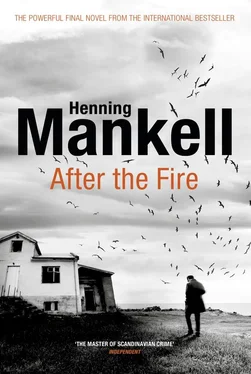But I did fall asleep, right in the middle of that thought, surrounded by mice seeking shelter from the cold.
The following day I called the insurance company. I had expected a long-drawn-out infuriating duel between myself and uncooperative bureaucrats, but once I got through to Jonas Andersson, everything was very straightforward. A little too straightforward, perhaps. Were there invisible pitfalls ahead, to be revealed only gradually? However, I chose to believe what Andersson said. The new house would be built, starting in the spring. If necessary he could send me a list of suitable building firms in the area, recommended by the insurance company.
After lunch I had just decided to call Kolbjörn when I heard Jansson’s boat approaching. I went down to the jetty to meet him. Sometimes I thought I could tell from the sound of the engine what mood Jansson was in and what he wanted from me. It was all in my mind, of course, but the idea amused me.
He moored by the jetty but didn’t switch off the engine, which meant he was intending to stay for only a short time. There was therefore no danger that he would ask me to examine him because of some new imaginary ailment.
He climbed onto the jetty; we shook hands and then he reached inside his thick jacket and handed me a letter.
‘You’ve retired,’ I said. ‘You don’t deliver the post any more.’
‘Wiman asked me to bring you this.’
I took the envelope, which wasn’t sealed. It contained old black and white photographs of my grandparents’ house. I merely glanced inside; I didn’t want to reveal the contents to Jansson. However, as I slipped the envelope into my pocket I realised he knew exactly what was in there; he had already opened it, of course. I felt an almost irresistible urge to push him into the cold water. Perhaps he noticed something because he took a step back. I smiled.
‘Could you tell your successor that from now on I would like my post delivered again, please?’
‘You’ve changed your mind?’
‘Yes, just now. Thank you for bringing the photographs.’
‘What photographs?’
I thought I ought to come straight out with it, put into words what everyone in the archipelago knew: that during his long years as a postman Jansson had read final demands, letters of condolence, threatening letters, friendly letters, letters that didn’t say much at all. He had read the lot. And now he stood here pretending he didn’t know what was in the envelope from Wiman.
‘I’d like you to leave now,’ I said in a pleasant tone of voice. ‘I have a lot to do today. Can I pay you for the delivery?’
He shook his head and clambered down into the boat, but remained standing with one hand on the bollard.
‘Could it have been Oslovski?’ he asked.
I didn’t understand the question.
‘Who burned down the houses.’
‘Why the hell would she have done that?’
‘Nobody knew anything about her. She was a foreigner. God knows what a person with one eye is capable of.’
I was astounded by his grotesque logic. What could the fact that Oslovski had one eye possibly have to do with the arson attacks? I usually let Jansson’s stupid comments go, like water off a duck’s back, but not this time.
‘Of all the possible pyromaniacs, Oslovski is the least likely. Besides which she’s dead.’
Jansson was offended. He let go of the bollard and cast off the mooring rope. For once we didn’t wave to one another as he reversed away from the jetty.
I went back to the site of the fire. A couple of crows pecking among the sooty ruins rose into the air and flapped away. I would bury Giaconelli’s buckle when the foundations were tidied up, ready for the new house; it would be a token, a memorial to the house that had once stood there — but also a memorial to the man who had been a master shoemaker.
I happened to be listening to the radio once when a world-famous soprano who had appeared on stage in the biggest theatres all over the world was being interviewed. She was asked what the most important thing was for an opera singer.
‘Good shoes,’ she had replied without hesitation.
I understood what she meant. Good shoes in which to walk, stand and work are every bit as important for a fisherman as for a surgeon.
Right now I longed for the wellington boots I had ordered months ago, which still hadn’t arrived.
I took out my phone and called the chandlery. Eventually fru Nordin answered; I wondered if I had woken her. Perhaps she had made herself a bed in the storeroom for the time of year when customers were few and the bell over the door rarely pinged? I suspected she was one of those people in the archipelago who went into hibernation when winter began to press down on the earth.
My wellington boots still hadn’t arrived.
I sat down at the table in the caravan with Wiman’s photographs spread out in front of me. The oldest was from around 1900. The porch hadn’t yet been built. My grandfather was standing by the front door with my grandmother on a stool next to him. They were still young. My grandfather had a moustache; the bushy beard was still far in the future. On the back of the picture was a note stating that it was probably taken by Robert Sjögren, who travelled around the islands at the turn of the century.
I went through the pictures one by one. Most were taken from the front; the back of the house didn’t appear anywhere.
In one of the photographs, dated ‘Summer 1946’ by an unknown hand, the white garden furniture had appeared. The porch had been added over twenty years earlier. My grandparents were sitting on the ribbed wooden chairs with cups of coffee and a plate of biscuits. In the half-shadows, as if he were slightly shy of the unknown photographer, sat a man named on the back as Adolf Sundberg.
I suddenly remembered him; he came walking towards me as a distant memory, growing clearer as he got closer. Adolf Sundberg lived to the age of a hundred and four. He was born in 1899, and even as a young man he had said that he intended to live during three centuries. Which he did — he passed away in 2003.
He often visited my grandparents. He was a good raconteur, so I would often hang around as he sat on one of those white chairs drinking coffee.
He once told a story about his family that my grandparents discussed for ages afterwards. Was it true or not? I can’t have been more than ten years old at the time, but that was when I really understood the huge, almost immeasurable distance between a lie and the truth, between a tall tale and an account of something that had actually happened, something no one need ever doubt.
Adolf Sundberg had arrived in the archipelago as a stranger. His family originated inland, in the town of Alingsås far away in Västergötland, on the plains stretching down towards the sea. He had served on board two-masted wooden ships carrying cargo around the inner archipelago, but after a quarrel with a captain about a broken compass, he had signed on with Blåsut , which was lying idle in Västervik, before it set sail again, travelling between Gävle and Copenhagen. After a few years he came ashore, married a girl from Kalmar and took over the farm her uncle had owned. That was how Adolf Sundberg from Västergötland came to the islands. At a haymaking party where a great deal of schnapps had been consumed he told the story that was a discussion topic for ever afterwards, when people met and wondered how reliable Adolf Sundberg actually was.
In Alingsås, he said, his grandparents had owned a pharmacy. One of the most popular products back in the 1840s was leeches. His grandfather had come up with the brilliant idea of breeding leeches in an old fish pond in the municipal park, instead of the ornamental carp that had once occupied the muddy, evil-smelling water. Every time the supply of leeches dropped and the glass jars in which they were kept began to look empty, Adolf’s grandmother knew what was coming. There was no point in protesting, even though she found the whole process utterly humiliating. They would set off from home at first light, Grandfather carrying a long pole and Grandmother dressed in a simple shift, which she concealed beneath a capacious coat. She probably put up a bit of a fight when they reached the pond, but to no avail. She stripped naked; her body was fat and shapeless. She waded out into the pond until the water covered her breasts. Grandfather held out the pole so that she would have something to grab; if she fell over she would drown, because she couldn’t swim and Grandfather would never be able to drag her out. Then she stood there as the eager leeches sank their teeth into her ample body. When she had had enough, she made her way back to dry land with the black leeches firmly attached, mainly to her backside. When Grandfather sprinkled salt on them they let go and dropped into the glass jars.
Читать дальше












